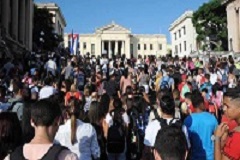Accounting Procedure for Subsidies in the Ministry of Higher Education
Keywords:
accountingAbstract
This work is part of the case study of the accounting procedure for the treatment of subsidies granted by the state budget as technology that contributes to the development of public spending management in the entities of the Ministry of Higher Education of Cuba, from the perspective of the social problems of science, technology and innovation.
References
Bifani, P. (1993). Cambio tecnológico y transferencia de tecnología, en Estrategias, planificación y gestión de ciencia y tecnología. UNESCO. Editorial Nueva Sociedad. Caracas.
Borrás, F., & Rodríguez, C. E. (2014, Enero-Diciembre). La educación contable en Cuba: conocimientos, habilidades y valores. Visión Contable(12), 221-245. Recuperado en septiembre 15, 2019
Consejo de Estado. (1999). Decreto-Ley No.192 de la Administración Financiera del Estado, ed. Ordinaria No.020 de 12 de abril de 1999. Ed. Gaceta Oficial La Habana, 1999
del Toro, J. C., Morales, M. G., Reyes, C. M., & Reyes, A. C. (2013). Contabilidad del sector gobierno a nivel municipal. La Habana, Cuba: Ed. Félix Varela.
del Toro, J. C. (2018). Procedimiento para el análisis de la viabilidad de las normas contables en Cuba. Revista cubana de finanzas y precios, 2 (1), 51-62. Recuperado de http://www.mfp.gob.cu/revista_mfp/index.php/RCFP/article/view/06_V2N12018_JCTR
del Toro, J. C. (2019). Implementación del Sistema de Contabilidad Gubernamental en el sector gobierno en Cuba. Tesis en opción al grado científico de Doctor en Ciencias. Recuperado de https://www.researchgate.net/publication/336672415_Implementacion_del_Sistema_de_Contabilidad_Gubernamental_en_el_sector_gobierno_en_Cuba?_sg
Guevara, E. C. (1977). Notas para el estudio de la ideología de la Revolución cubana (Vol. 4). La Habana: Ciencias Sociales.
IFRS Foundation. (2015). Norma Internacional de Contabilidad No. 20 Contabilización de las subvenciones del gobierno e información a revelar sobre ayudas gubernamentales. In Normas Internacionales de Información Financiera. (Vol. Parte A. IFRS. Recuperado de www.ifrs.org.
Lauchy Sañudo, A., & Acosta Chang, E. (2018). Gestión económico-financiera sostenible de las instituciones de educación superior en Cuba. Revista cubana de finanzas y precios , 2 (2), 139-148. Recuperado de http://www.mfp.gob.cu/revista_mfp/index.php/RCFP/article/view/14_V2N12018_ALS
Lucca, G. (2010). El triángulo de Sábato como paradigma de una exitosa inserción internacional. Revista de Economía y Comercio Internacional(4). Recuperado de http://arinternacional.com.ar/blog2/wp-content/uploads/2014/06/Informe-Econ%C3%B3mico-Mayo-2014.pdf
Marx, C. (1973). El Capital. Tomo II. La Habana: Editorial Ciencias Sociales.
Núñez. (1999). La ciencia y la tecnología como procesos sociales. Lo que la educación científica no debería olvidar. La Habana, Cuba: Félix Varela.
Núñez, J. (2010). Conocimiento académico y sociedad. Ensayos sobre política universitaria. La Habana: UH.
Panez, J. (n.d.). Ministerio de Economía y Finanzas de Perú. Recuperado en septiembre 18, 2019 de www.mef.gob.pe/en/documentacion-sp-9701/388-contabilidad-publica/documentacion/1790-la-armonizacion-contable-y-el-proceso-epistemologico-de-la-contabilidad
Partido Comunista de Cuba. (2017). Actualización de los Lineamientos de la Política Económica y Social del Partido y la Revolución para el período 2016-2021 aprobados en el 7mo Congreso del Partido y la Asamblea Nacional. La Habana: Editora Política.
Sábato, J. A. (1975). El pensamiento latinoamericano en la problemática ciencia-tecnología-desarrollo-dependencia. Paidós.
Santos, C. M. (2017, Julio-Diciembre). Diseño e implementación del procedimiento contable en la Organización Nacional de Bufetes Colectivos. Cofin Habana, 11(2). Recuperado septiembre 16, 2019 de http://scielo.sld.cu/scielo.php?script=sci_arttext&pid=S2073-

Downloads
Published
How to Cite
Issue
Section
License
Copyright (c) 2019 Elena María Acosta Chang

This work is licensed under a Creative Commons Attribution-NonCommercial-NoDerivatives 4.0 International License.
- Sending a contribution to the Cuban Magazine of Finance and Prices (RCFP) implies a non-exclusive assignment of rights, which includes: Reproduce the Article in whole or in part and communicate the Article to the public in print or electronic format, combined or not with the works of third parties, such as by making the Article available to the public via the Internet or any other network, as part of a database, with on-line or off-line access, for use by third parties; Translate the Article into other languages and release the translation to the public; Create adaptations, summaries, or excerpts of the Article and other derivative works thereof, and exercise all of your rights in such adaptations, summaries, excerpts, and derivative works; Include the Article, either in its translated, adapted or summarized version, totally or partially, in a computerized database and make it available to third parties; Include the Article, totally or partially, either in its translated, adapted or summarized version, in a selection or compilation of texts; Rent or lend the Item to third parties; Reproduce the Article by means of reprography, without prejudice to legal limitations.
The Author of articles published in the Cuban Magazine of Finance and Prices (RCFP) may exercise the following rights:
- Reproduce the Article, totally or partially, and disseminate its content or make it available to the public, in printed or electronic format, as part of a teaching content or as a compilation, for use in the academic or research field in the institution to the one to which the Author belongs or in those institutions to which he belongs.
- Publish the Article on the Internet or authorize the Author's institution (or any other appropriate organization) to do the same, immediately from the date of publication of the Article in the journal: within the institution's closed network (p. eg, the intranet); or in publicly accessible institutional repositories or centrally organized repositories, provided that a link to the Article is included on the journal's website.
- Grant to the Author's own institution (or any other appropriate organization) the authorization to reproduce the Article in order to prevent its deterioration or, if the original is in an obsolete format or the technology to use it is not available, in order to ensure that the Article remains available for teaching or research purposes;
- Present the Article at a meeting or conference, and distribute copies of the Article to those attending the event.
- Grant end users at the Author's own institution (or any other appropriate organization) permission to copy, use, transmit, and publicly perform the work and to create and distribute derivative works.



